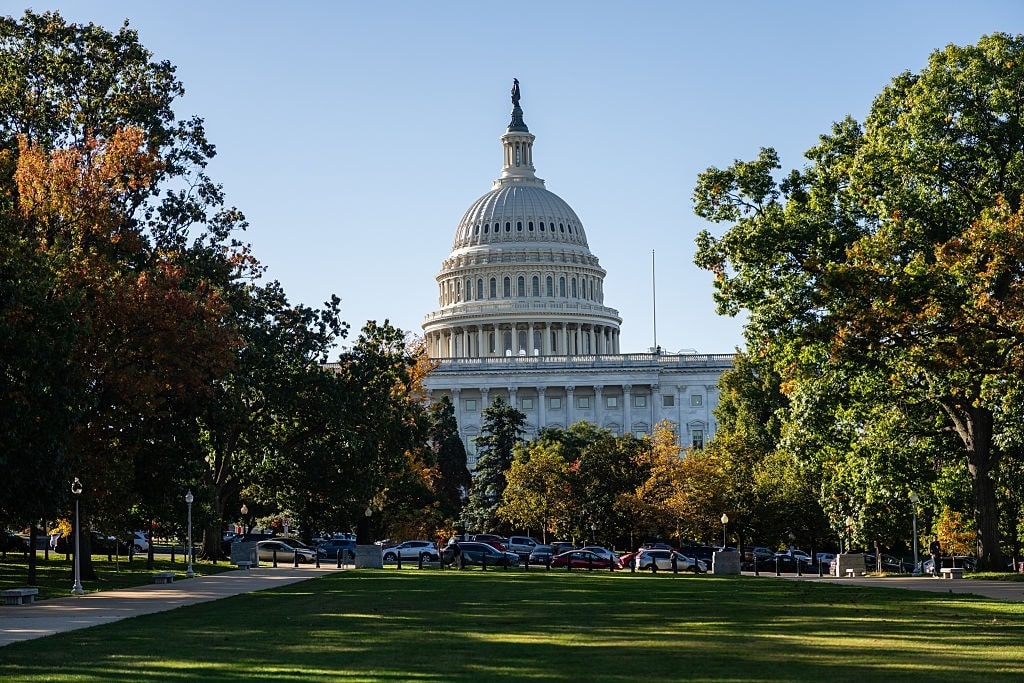If the Shutdown Doesn’t End Soon, Could Things Go Nuclear? – Liberty Nation News

The House passed a continuing resolution to prevent the federal government shutdown before it even began. However, it did so on a party-line vote, with support from just one Democrat, Jared Golden of Maine. For nearly a month, both sides of the aisle in Congress have held firm in their respective stances—yet now, things are beginning to shift.
### Democrats Near Compromise, But Senate Republicans Hold the Key
Democrats appear on the verge of compromise, but the question remains: will Senate Republicans join them, or seek a more drastic method to end the shutdown?
—
### A New Offer Emerges
The Senate reconvened on October 27 at 3 p.m., with one of its first priorities being the almost month-long government shutdown. While a continuing resolution is on the table, Democrats largely oppose it. Passed almost exclusively by House Republicans, the stopgap funding bill has garnered consistent support from most Republicans and a few Senate Democrats, yet it cannot reach the crucial 60 votes needed to overcome a filibuster.
With the looming November 1 deadline, when several federal benefit programs risk losing funding, a Senate Democrat has proposed a compromise.
—
### The Compromise Proposal
Democratic leadership has demanded a permanent extension of the enhanced ACA subsidies introduced in response to the COVID-19 pandemic, along with a rollback of Trump-era and GOP-backed Medicaid reforms—a package estimated to cost $1.5 trillion over the next decade.
However, Senator Chris Murphy (D-CT) suggested on CNN’s *State of the Union* that a majority of Democrats might support ending the shutdown for roughly $20 billion.
> “We could probably come up with something pretty quick,” Murphy said. “The president just announced $20 billion going to bail out the Argentinian economy. For $20 billion, we could open the government back up. That’s enough money to relieve a lot of pressure. We can get this deal done in a day.”
The current “clean” continuing resolution would fund the government through November 21. It remains unclear whether Murphy’s $20 billion figure covers one year or ten, or whether the rest of the Democratic Party would back such a plan. Still, Republicans need only five Democrats to cross the aisle to pass the resolution.
—
### Government Shutdown or Senate Tradition: Which Ends First?
Republicans have shown some willingness to discuss extending enhanced subsidies—provided that reforms accompany any extension. Senate Majority Leader John Thune (R-SD) has promised a vote on the matter, but only after the government reopens via the clean continuing resolution currently on the table.
As the late Herman Cain famously said, “the devil is in the details.” Whether a bipartisan group of senators can craft a $20 billion addition satisfying enough members from both parties to surpass the 60-vote threshold remains uncertain. And even if the Senate reaches a compromise, the House—known for its partisan divides—must also approve it.
—
### The Nuclear Option: A Possible Shutdown Endgame
There is one additional path the Senate might take to end the shutdown quickly: the nuclear option.
Typically, Senate votes require a three-fifths majority to invoke cloture, ending debate and allowing a final vote. While final passage of a bill needs only a simple majority, debate can be prolonged indefinitely through filibusters unless 60 senators vote to cut it off.
Historically, the filibuster evolved throughout the 19th and 20th centuries. The cloture rule was adopted in 1917, originally requiring a two-thirds vote, later lowered to three-fifths (60 votes) in 1975.
—
### Changes to the Filibuster Over Time
The cloture rule initially applied to both legislation and nominations. However, in 2013, frustrated by frequent Republican filibusters blocking President Obama’s nominees, then-Senate Majority Leader Harry Reid invoked the nuclear option. This procedural maneuver eliminated the filibuster for most presidential nominations by a simple majority vote.
Four years later, in 2017, Senate Majority Leader Mitch McConnell did the same for Supreme Court nominations, clearing the path for Justice Neil Gorsuch.
Currently, only the legislative filibuster remains intact—the 60-vote requirement for bills. Democrats have attempted to abolish it during President Biden’s tenure but were blocked by Senators Kyrsten Sinema and Joe Manchin.
—
### Republicans Consider Going Nuclear
Now, at least two Senate Republicans are publicly considering using the nuclear option themselves.
Senator Rick Scott (R-FL) acknowledged last week that if no progress is made, ending the filibuster might be unavoidable.
> “If we can’t get anything done, that’s what [Democrats] are gonna force,” Scott said.
Senator Josh Hawley (R-MO) expressed urgency:
> “I’m not willing to see children in my state go hungry … over some Senate procedure.”
Will Republicans choose to eliminate the filibuster rather than pass a resolution that includes permanent extensions of emergency ACA subsidies? It’s a drastic step—but one that may be inevitable.
—
### The Implications of Killing the Filibuster
Only two moderate Democrats defended the filibuster in the previous Congress, but both are now gone. Current Democratic leadership has shown willingness to “go nuclear” on legislation central to their agenda.
If the party controlling both chambers and the White House eliminates the filibuster, it gains the power to push through its entire legislative agenda—regardless of opposition or extremity.
The filibuster has been dying a slow death since Reid’s initial change. It seems likely that some crisis will serve as its final nail in the coffin.
—
### What Happens Next?
The key question remains: will Congress broker a deal to end the shutdown first, or will the Senate tradition of the filibuster finally fall?
With pressure mounting and deadlines fast approaching, all eyes are on Capitol Hill. The coming days may prove decisive in determining both the fate of the government shutdown and the future of Senate procedure.
https://www.libertynation.com/if-the-shutdown-doesnt-end-soon-could-things-go-nuclear/









